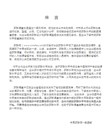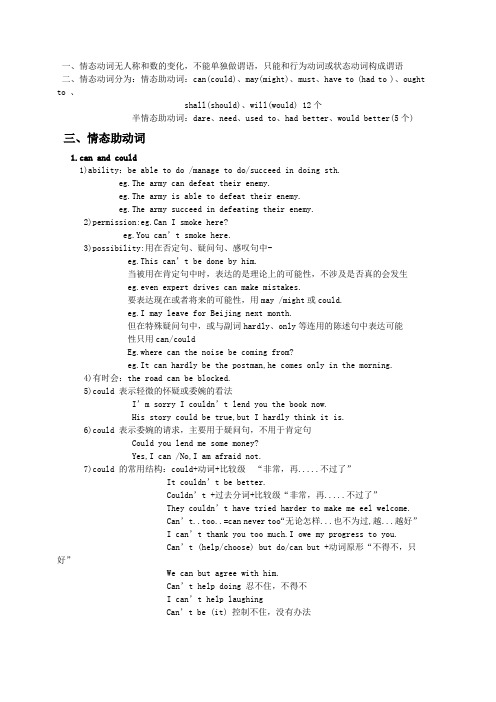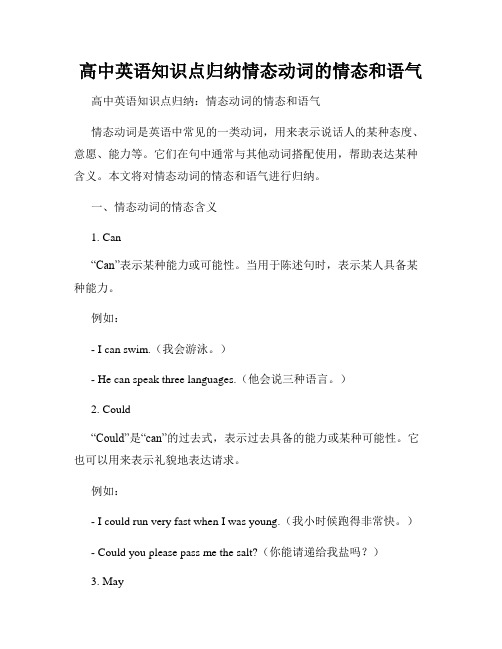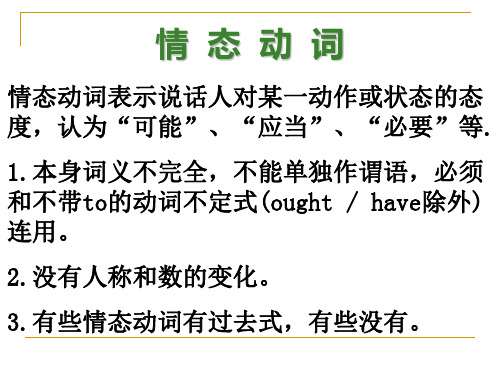高中英语情态动词
高中英语语法讲义-情态动词

He may [might] be writing a letter. 他可能在写信。
They may [might] be going abroad next month. 他们可能在下个月出国。
③ 后接动词完成式,表示对过去可能发生的事进行推测:
另外,could还可与表示感知的动词(如see, hear, smell, taste, feel, understand等)连用表示的特定能力:
Looking down from the plane, we could see lights on the runway. 从飞机上向下看,我们可以看见机场跑道上的点点灯火。
2) 表示委婉的批评或责备:
You might have made greater progress. 你的进步本来可更大一些的。
You might at least have answered my letter. 你至少可以回我一封信嘛。
③ 表示“差点儿就要”:
I could have died laughing. 我差点儿笑死了。
二、may与might的用法
1. 表示允许
注意以下两种情况:
(1) 表示请求允许(即请求别人允许自己做某事),两者都可用,只是 might 表示的语气较委婉(但并不表示过去):
May [Might] I sit here? 我可以坐在这里吗?
1) 表示过去某事可能发生而实际上却并没发生:
A lot of men died who might have been saved.很多人本来可以获救的却死了。
It was really very dangerous. I might have killed myself. 那真的是太危险了,我差点没命了。
高中英语情态动词详细讲解及例句

一、情态动词无人称和数的变化,不能单独做谓语,只能和行为动词或状态动词构成谓语二、情态动词分为:情态助动词:can(could)、may(might)、must、have to (had to )、oughtto 、shall(should)、will(would) 12个半情态助动词:dare、need、used to、had better、would better(5个)三、情态助动词1.can and could1)ability:be able to do /manage to do/succeed in doing sth.eg.The army can defeat their enemy.eg.The army is able to defeat their enemy.eg.The army succeed in defeating their enemy.2)permission:eg.Can I smoke here?eg.You can’t smoke here.3)possibility:用在否定句、疑问句、感叹句中-eg.This can’t be done by him.当被用在肯定句中时,表达的是理论上的可能性,不涉及是否真的会发生eg.even expert drives can make mistakes.要表达现在或者将来的可能性,用may /might或could.eg.I may leave for Beijing next month.但在特殊疑问句中,或与副词hardly、only等连用的陈述句中表达可能性只用can/couldEg.where can the noise be coming from?eg.It can hardly be the postman,he comes only in the morning.4)有时会:the road can be blocked.5)could 表示轻微的怀疑或委婉的看法I’m sorry I couldn’t lend you the book now.His story could be true,but I hardly think it is.6)could 表示委婉的请求,主要用于疑问句,不用于肯定句Could you lend me some money?Yes,I can /No,I am afraid not.7)could 的常用结构:could+动词+比较级“非常,再.....不过了”It couldn’t be better.Couldn’t +过去分词+比较级“非常,再.....不过了”They couldn’t have tried harder to make me eel welcome.Can’t..too..=can never too“无论怎样...也不为过,越...越好”I can’t thank you too much.I owe my progress to you.Can’t (help/choose) but do/can but +动词原形“不得不,只好”We can but agree with him.Can’t help doing 忍不住,不得不I can’t help laughingCan’t be (it) 控制不住,没有办法It can’t be helpedCan’t....without 没有...就不能One can’t succeed without perseverance.2.may and might1)permission:May I use your pen?Yes,you may./No,you may not.2)Possibility:用于推测,表示不确定,不用于疑问句中She may know Tom’s address.出现I’m afraid.I’m not sure等表示不确定时,常用may/might.I’m afraid he might not come to attend the meeting today.从语气上判断,may表示的可能性比might 大,might更多的表示怀疑He may be very busy now.He might be very busy now.3)用于让步状语从句中However hard you may study,you cannot master English in a month.4)用于祈使句,表示祝愿May you succeed!5)might 常用于表示轻微的责备和委婉的请求You might post the letter for me if you are going near a post box.You might have let me know before!6)习惯用法:may as well do”理所当然,有足够的理由”She may be proud of her sonMay /might (just) as well do=had better do(最好)You might as well stay at home tonight.May/might as well+do A+as+do+B”与其做B不如做A”You might as well throw the money away as lend it to him.One may as well not know a thing at all as know it but imperfectly 3.must and have to1)表示义务,一定要,必须You must arrive in good time.The meeting is very important.2)表示肯定性或难以避免,必然会,肯定会All men must die.3)must 表示有把握的推测,一定是,准时Must do/must be doing/must have doneThe tall fellow must be a basketball player.Let’s have something.You must be starving.He must have received mu letter which has mailed last week.4)must 表示非要,偏要,常以第二人称为主语,意指不耐或令人不愉快的事情,用于其他人称,表示主语固执,意为偏偏Why must you buy that car?Jane was never a pleasant young girl.After you gave her your advice,she must goand do the opposite.5)must 的三种否定形式表示不可能 must be --can’t be must have done--can’t have done You must have met him before.You can’t have met him before.表示不必 must do--need not to/don’t have toWe must get up at six tomorrow morning.We don’t have to get up at six tomorrow morning.表示决不能,严禁 must--mustn’tYou mustn’t park your car here.6)回答以must提问的句子Must we clean all the rooms?Yes ,you must/No ,you don’t have to/No ,you needn’t7)must 可做名词,表示必须有的东西,必须做的事Warm clothes are a must in the mountains.8)must和have to 表示必须时,有一下差别Must 表示的是说话人主观的看法,而have to则往往强调客观需要The play is not interesting ,I really must go now.I have to work when I was your age.Must 一般只表现在,have to 则有更多的时态。
高中英语知识点归纳情态动词的情态和语气

高中英语知识点归纳情态动词的情态和语气高中英语知识点归纳:情态动词的情态和语气情态动词是英语中常见的一类动词,用来表示说话人的某种态度、意愿、能力等。
它们在句中通常与其他动词搭配使用,帮助表达某种含义。
本文将对情态动词的情态和语气进行归纳。
一、情态动词的情态含义1. Can“Can”表示某种能力或可能性。
当用于陈述句时,表示某人具备某种能力。
例如:- I can swim.(我会游泳。
)- He can speak three languages.(他会说三种语言。
)2. Could“Could”是“can”的过去式,表示过去具备的能力或某种可能性。
它也可以用来表示礼貌地表达请求。
例如:- I could run very fast when I was young.(我小时候跑得非常快。
)- Could you please pass me the salt?(你能请递给我盐吗?)3. May“May”用于表示允许、请求或推测。
例如:- You may go now.(你现在可以走了。
)- May I borrow your pen?(我可以借用你的钢笔吗?)- She may be at home.(她可能在家。
)4. Might“Might”是“may”的过去式,表示过去某种猜测、推测或可能性。
例如:- He might have forgotten the appointment.(他可能忘记了约定。
)- It might rain later.(说不定一会儿会下雨。
)5. Must“Must”表示一种推测或强烈的命令。
例如:- It must be cold outside.(外面肯定很冷。
)- You must finish your homework before going out.(出去之前你必须完成作业。
)6. Shall“Shall”常用于疑问句中,表示征求对方的意见或提出建议。
情态动词 高中英语

2) 在疑问句中could可以代替can,表示 委婉的语气。
Could I use your dictionary?
(注意:回答这样的问题不用could,须用can)
3) can和be able to在表示能力这一点上是 同义词,意义差别不大,只是be able to可有 各种时态变化。No one is able to do it.
★如果用作vt 和不定式连用,可用于各种 结构:Does he need to know it?
This question needs to be discussed.
You don’t need to do it yourself. (这种否定形式较文气,口语中用needn’t 更多一些) ★need not + 完成式 You needn’t have done so. We needn’t have got up so early.
I haven’t been able to find the book.
★当表示“经过努力,设法做成某事”时, 不用could,须用was/were able to.
The fire spread through the hotel very quickly,
4) 表示“推测”,后跟不定式的一般式、 进行式,表示对现在的推测;后跟不定式 的完成式,表示对过去的推测。
We could have told him earlier.
2. ay / might
1) 表示允许或征询对方许可,有“可以”的 意思。用作此义时,否定形式可用may not, 但在表示“不可以”、“禁止”、“阻止” 等意思时,常用must not (mustn’t). You may go now. May I watch TV after supper? Yes, you may. / No, you mustn’t. ★有时为使语气婉转一些,可以用下面的方 式回答这种问题:
高中英语语法讲解: 情态动词

高中英语语法讲解:情态动词概述1.共有10个情态动词:can/could, may/might, will/would, shall, should, ought to, must;2个半情态动词need, dare2.特点:(1)情态动词后加动词原形(即不带to的不定式)一起构成谓语;(2)没有人称和数的变化;(3)多数情态动词有过去式,但其过去式有时并不表示时态,而只起“委婉或不确定语气”的作用。
Would you do me a favour? She may/might be watering the flowers now.3.情态动词在句子中可发挥不同作用,如表能力,表责任与义务,表推测,表征求允许,表请求,表建议,表语气态度等等He can/could run 100 meters in 11 seconds.You should/ought to/must work hard to win a gold medal.Can/Could/May/Might I watch the Olympics tonight?Will/Can/Could/Would you help me with my training?He might/may/could/should/ought to/will/must watch the football match tonight.I suggest that you should watch the opening ceremony.Can this be true?4.情态动词+do 表对一般现在或将来情况的推测情态动词+ be doing 表对正在发生的事情的推测情态动词+have done 表对过去已经发生的事情的推测一、can/could 的用法1.表能力(1) can do现在一般的能力(2) could do过去一般的能力(3) could have done过去有能力做但没做具体某事(4)was/were able to do = managed to do/ succeeded in doing 过去有能力做且做了具体某事。
高中英语情态动词

A. would have come B. could come
C. have come
D. had come
5. Life is unpredictable; even the poorest
_____ become the richest. <XX2014>
A. shall
B. must
C. need
themselves, _____ bring me
food. <XX2014>
A. might
B. would
C. should
D. could
3. I’ve ordered some pizza, so we _____ worry
about cooking when we get home tired.
used to 表示过去常常<现在已经不再>. e.g. There used to be a temple here. had better 表示"最好". e.g. You had better finish it now.
[注意] ① could, should, might不一定与过去时间
2> 表示客观可能性. e.g. Accidents can happen to any drunken driver.
3> 表示请求和允许. e.g. — Can I have a look at your design? — Yes, of course you can.
4> 表示惊讶、怀疑、不相信的态度.〔主要用 于否定句,疑问句和惊叹句. e.g. What can he be doing at this time of night?
情态动词高中知识点高三
情态动词高中知识点高三情态动词是一类具有特殊意义和用法的动词,它们在句子中一般与实义动词连用,表示说话人的推测、命令、请求、建议等情态。
在高中英语学习中,掌握情态动词的正确用法至关重要。
本文将介绍情态动词的相关知识点,帮助高三学生更好地运用这一语法现象。
一、情态动词的定义情态动词,又称情态助动词,是用来表示说话人对某种动作或状态的态度、推测、可能性、能力、意愿、义务等情态的一类特殊动词。
常见的情态动词包括can、could、may、might、must、shall、should、will、would等。
二、情态动词的用法1. 表示能力情态动词can表示某人具有能力或可能做某事,could用于过去说法。
例如:- She can speak three languages fluently.(她能说流利的三种语言)- He could lift the heavy boxes when he was younger.(他年轻时能搬起这些沉重的箱子)2. 表示推测和可能性情态动词may、might、could用于表示推测和可能性。
may用于表示较为肯定的推测,might和could表示推测的可能性较小。
例如:- The weather is cloudy, it may rain later.(天气多云,可能会下雨)- He might be late for the meeting.(他可能会迟到会议)3. 表示义务和建议情态动词must表示说话人对某种行为具有强烈的责任感或坚决要求,should表示建议。
例如:- We must obey the laws of the country.(我们必须遵守国家的法律)- You should apologize to your friend for your mistake.(你应该为你的错误向朋友道歉)4. 表示许可和请求情态动词can、may、could用于表示允许和请求。
高中英语语法专题情态动词与常考短语
高中英语语法专题情态动词与常考短语高中英语语法专题情态动词与常考短语情态动词是许多同学在英语语法中最简单丢分的一块。
情态动词的用法很简单,情态动词都有各自的含义和搭配,如何学好英语?我在这里整理了相关资料,快来学习学习吧!高中英语语法专题情态动词一、can和could1、can的用法(1)表示体力和脑力方面的力量。
(2)表示对现在的动作或状态进行主观的猜想,主要用在否定句和疑问句中。
(3)表示可能性,理论上的可能性,意为“有时候可能会”,可用于确定句。
(4)表示允许,意思与may接近。
(5)表示说话人的推想、怀疑、惊异、猜想或不愿定等,主要用于否定句、疑问句或感叹句中。
(6)can的特别句型cannottoo / enough表示“无论怎么。
也不过分”。
“越。
越好”。
cannot but+ do sth.表示“不得不,只好”。
2、could的用法(1)表示力量,指的是过去时间。
(2)表示允许,指的是过去时间。
(3)表示可能,可以指过去时间,也可以指现在时间,表示语气缓和。
(4)委婉客气地提出问题或陈述看法,指的是现在时间。
主要用于疑问句,回答时用can。
3、can与could的区分can表推想时只用于否定句和疑问句(could无此限制)。
couldnt 的可能性比cant小。
4、can与be able to的区分(1)现在时:无区分,但后者不常用。
(2)完成时;can没有完成时,此时要用have(has,had)been able to。
(3)将来时:can没有将来时,要用will be able to。
(4)过去时:could表示一般力量,was/were able to 表示在详细场合通过努力胜利做成某事的力量。
二、may 和might1、may的用法(1)表示询问或说明一件事可不行以做。
(2)表示一件事或许会发生或某种状况可能会存在,通常用在确定句和否定句中。
留意:表示可能性时,cant语气强,表示“不行能”,may not 语气弱,表示“可能不”。
高中英语知识点归纳情态动词和实义动词的用法
高中英语知识点归纳情态动词和实义动词的用法情态动词和实义动词是高中英语中常见的两类动词,它们具有不同的用法和含义。
下面将对情态动词和实义动词的用法进行归纳总结。
一、情态动词的用法情态动词是表示说话人的语气、态度、情感等方面的动词,常用的情态动词有can,could,may,might,must,shall,should,will,would等。
情态动词的用法如下:1. 表示能力和技能:- can 和 could 表示能力,主要用于肯定句和疑问句中。
- can 用于现在和将来时,could 用于过去时。
- She can swim.(她会游泳。
)- Could you play the guitar?(你会弹吉他吗?)2. 表示许可和禁止:- can 和 may 表示许可,可以用于肯定和疑问句中。
- cannot 和 must not 表示禁止。
- You can go now.(你现在可以走了。
)- May I use your phone?(我可以用一下你的手机吗?)- You must not smoke here.(你不能在这里抽烟。
)3. 表示推测和可能性:- may,might 和 could 表示可能性,可用于肯定和疑问句中。
- may 和 might 可用于现在和将来时,could 可用于过去时。
- He may come tomorrow.(他明天可能来。
)- Could it be true?(这可能是真的吗?)4. 表示义务和建议:- must 和 have to 表示义务,表示说话人的主观意愿。
- should 和 ought to 表示建议或期望。
- We must finish our homework.(我们必须完成作业。
)- You should see a doctor.(你应该去看医生。
)二、实义动词的用法实义动词是指具有实际意义的动词,用来表示具体的动作、状态或变化。
高中英语知识点归纳情态动词和过去进行时的否定和疑问句总结
高中英语知识点归纳情态动词和过去进行时的否定和疑问句总结情态动词和过去进行时的否定和疑问句是高中英语中的重要知识点,掌握了这些内容可以帮助学生更好地理解和运用英语语法。
本文将对情态动词以及过去进行时的否定和疑问句进行归纳总结。
一、情态动词(Modal Verbs)情态动词是用来表示说话人对某种行为或状态的态度、能力、建议、意愿、可能性等的动词。
情态动词一般没有人称和数的变化。
常见的情态动词包括can, could, may, might, shall, should, will, would, must等。
1. 能力和能力推测情态动词can表示某人具备某种能力或技能,例如:- She can swim.(她会游泳。
)情态动词could表示过去某人具备某种能力或技能,例如:- When he was young, he could speak five languages.(他年轻的时候会说五种语言。
)情态动词may和might表示某人具备某种可能性,例如:- It may rain tomorrow.(明天可能下雨。
)- He might be late for the meeting.(他可能会迟到会议。
)2. 请求和允许情态动词can和could可用于请求或征询意见,例如:- Can you help me with my homework?(你能帮我做作业吗?)情态动词may和might也可用于请求,但较为正式和客气,例如:- May I ask you a question?(我可以问你一个问题吗?)情态动词can和may还可以用于表示允许,例如:- You can go home now.(你现在可以回家了。
)- May I use your phone?(我可以用一下你的手机吗?)3. 推测和推测的过去形式情态动词must表示对某种情况的推测,认为某事发生是非常有可能的,例如:- He must be tired.(他一定很累。
- 1、下载文档前请自行甄别文档内容的完整性,平台不提供额外的编辑、内容补充、找答案等附加服务。
- 2、"仅部分预览"的文档,不可在线预览部分如存在完整性等问题,可反馈申请退款(可完整预览的文档不适用该条件!)。
- 3、如文档侵犯您的权益,请联系客服反馈,我们会尽快为您处理(人工客服工作时间:9:00-18:30)。
• Need • 用作情态动词时,后接动词原形,没有人 称与时态的变化,否定句在其后+not • You needn’t try to explain again. • You needn’t have told them again. I had told them already.
• 含有情态动词need的一般疑问句,肯定回答 用must, 否定回答用needn’t • Need I finish my work today? • Yes, you must. /No ,you needn’t. • Need 也可用作实义动词,其后接带to 的不 定式或动名词作宾语,接不定式表示主语与 谓语动词是主谓关系,接动名词表示被动。 • He needs to see a doctor right now. • The house needs painting.
表示应该的情态动词
• • • • • • 1、should/ought to 表示应该 表示现在或将来的责任、义务 You should/ought to paint your door. Yes ,I know I should/ought to. Shall 表示应该 用在主语是第三人称的陈述句中,表示要求、 规定、法令等中的义务。 • Passengers shall not talk with the driver while the bus is moving.
• 2. can 表示推测 • Can 表示客观的可能性,用于否定句和疑问句中, 但表示理论上的可能性或一时的情况时,用于肯 定句中。
• She lives in Paris but she speaks with a German accent. she can’t be French. • It can be quite windy there, especially in spring.
情态ቤተ መጻሕፍቲ ባይዱ词
表示能力的情态动词
• • • • 1、表示现在的能力 can或is/are able to Everyone here can speak English. He is able to give up his bad habits.
• 2、表示将来的能力 • 表示将来的能力用will be able to,不用can • One day people will be able to go to the moon on holiday. • 若表示现在决定将来是否有能力做某事, 则用can • Can you come to the party tomorrow?
1、Must 与have to 表示“必须”时,must 表示说话人的主观看 法 而have to 表示客观需要,因为常作“不得 不;只得;只好”否定式 don’t have to I don’t like to stay here any longer. I must leave now. It’s too late. I have to leave now.
• Can/could 表示请求、允许 • 表示委婉地请求或陈述看法,口语中多用 could,但回答时仍用can • Could I use your bike tomorrow morning. • Yes , you can.
• 2、may /might 表示请求、允许 • May /might 表示请求允许时,might比 may 语气更加委婉,是比较正式的用法, 给予允许时通常用may ,不用 might,其否 定的回答用mustn’t ,意为“禁止”。 • May I turn on the CD player? • No, you mustn’t.
• 4. shall 表示请求、允许 • Shall用于征求对方意见时,主要用于以第 一人称或第三人称为主语的疑问句, • Shall Tom go there with me tomorrow. • Shall 表示命令、警告、允诺、威胁等时, 常用语主语是第二、三人称的陈述句中。 • You shall go with me. • You shall fail if you don’t work harder. • He shall read the book when I finish reading. • He shall be punished.
• Will/ would 表示请求、允许 • Will/would 表示征求许可和提出请求时, 主要用于助于为第二人称的疑问句中, would此时并不表示过去,而表示委婉的语 气。 • Will you spell that for me? • Would you please come tonight?
• ③could have done表示过去有能力做却未 做 • I could have worked out the problem, but I didn’t.
表示推测的情态动词
• 1 may/might 表示推测
• May/might 表示把握性不大的推测,一般不 用于疑问句中。Might 表示的可能性比may 小。 • Ann may /might know Tom’s address.
• 5、should/ ought 表示推测 • 表示有较大可能实现的猜测、推论,通常译 为“可能,按理说应该”
• Dinner should be ready by now. • It ought to be a fine day tomorrow.
• Ought to /should • 一般说来,两者可换用,只是ought to 语 气略强。表示出于法令规则、行为准则、 道德责任等客观情况用ought to ;若用 should 则含有个人意见,强调主观看法 • You are his father. You ought to take care of him. • We should not use too many big words in our everyday speech.
• 2、Must 的一般疑问句其肯定答语用must, 否定回答用needn’t 或don’t have to • Must I tell her about our holiday plan? • Yes ,you must. • No, you needn’t /don’t have to.
• 3、Must 表推测时,只能用于肯定句中, 意为“一定,肯定” must +动词原形表示 对现在或经常发生的情况肯定的推测。 Must have done 表示对过去事实或情况的 肯定推测。 • Where is Mike? • He must be at the library. • 4、Must 意为“偏要,偏偏”时。指做令 人不快的事情。 • Must you shout so loudly? • Why must it rain on Sunday ?
• 6、will 表示推测 • Will用于谈论现在;would表示比较委婉的 语气,即可谈论现在也可谈论过去。 • This will be the house you’re looking for. • I think he would accept the invitation.
表示请求、允许的情态动词
• 3、表示过去的能力 • ①could 表示过去一般的能力,不表示做或 未做某事 • She could/was able to sing like an angel when she was a child. • ②was/were able to 表示过去有能力并成功 地做成某事 • The fire spread through the hotel very quickly but everyone was able to get out.
• 3、could 表示推测 • Could 表示客观的可能性,用于肯定句中、 否定句和疑问句中均可。 • That could be my train. • Could you run the company by yourself. • 4、must 表示推测 • Must 表示有根据、有把握的推测,只用于 肯定句 • He must be ill. He looks so pale.
